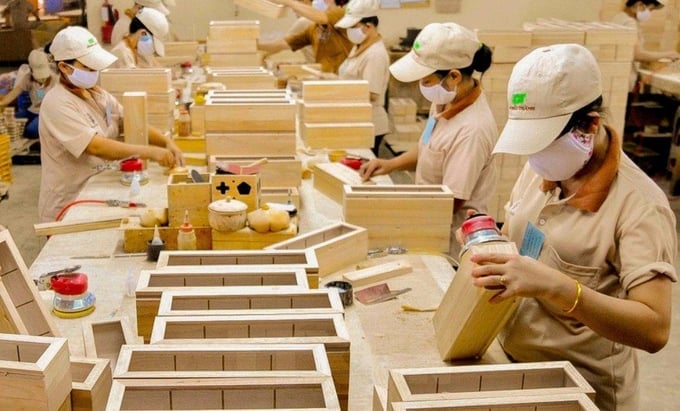May 24, 2025 | 07:56 GMT +7
May 24, 2025 | 07:56 GMT +7
Hotline: 0913.378.918
May 24, 2025 | 07:56 GMT +7
Hotline: 0913.378.918

Vietnamese wooden cabinet products will be investigated by the DOC starting in 2022.
The US Department of Commerce (DOC) has just issued the final conclusion of the investigation into product scope and anti-circumvention of wooden cabinets imported from Vietnam.
Regarding product scope investigation, the US has maintained that the preliminary conclusion had been adjusted in September 2023. Accordingly, the three cases of wooden cabinets imported from Vietnam, which have suspected components made in China, fell within the scope of the original tax order with China.
First, the product has door components, drawer tops and wooden frames made in China, then assembled in Vietnam and combined with cabinet boards and drawer boxes made in Vietnam.
Second, the product with doors, drawers and wooden frames is a semi-finished product manufactured in China, then further processed in Vietnam and combined with cabinet boards and drawer boxes produced in Vietnam.
Third, the product has semi-finished details of doors, drawers and wooden frames (including straps, pillars, boards) made in China, then continued to be processed in Vietnam and combined with Cabinet boxes and drawer boxes are made in Vietnam.
The DOC will send a notice to the US Customs and Border Protection (CBP) to instruct the application of the Certificate Regime to Vietnamese wooden cabinets. The mechanism will therefore allow local firms that do not fall into the above three cases to be exempted from anti-dumping or countervailing duties when exporting items to the US market.
Before exporting, Vietnamese businesses need to complete a self-certification declaration form for exporters and provide supporting documents (invoices, orders, production records, etc.) for US importers.
The importer must complete the importer self-certification form before the shipment date. In addition, businesses need to retain records and documents as a basis to prove that confirmation within 5 years from the time the shipment is exported. From there, competent US agencies carry out verification and verification if necessary.
In the latest announcement, DOC has also canceled the entire investigation into anti-dumping and anti-subsidy tax evasion on wooden cabinets imported from Vietnam.
To best protect the rights and interests of Vietnamese export enterprises, the Trade Remedies Department (Ministry of Industry and Trade) recommends that relevant associations and businesses learn and fully comply with regulations on self-defense mechanisms. confirmed by the United States.
Along with that, continue to monitor the Department's early warning information to develop appropriate business and export plans. If a problem arises, businesses need to notify it early to receive timely support.
DOC has initiated product scope review and anti-circumvention investigations respectively since May and June 2022. Previously, from April 2020 until now, the United States has imposed anti-dumping and anti-subsidy taxes on wooden cabinets originating from China, with the highest tax rate up to nearly 300%.
At a meeting with Senator Tammy Duckworth, Deputy Minister of Industry and Trade Nguyen Hoang Long expressed concerns regarding restrictions on access to the US market and the increasing frequency of trade defense cases against Vietnam's exported agricultural products.
The Deputy Minister also asked the US side to make assessments that are objective, fair and consistent with production practices in the process of recognition of market economy status for Vietnam.
Translated by Phuong Linh

(VAN) In the tranquil wetlands of Van Long, there are quiet souls who guard the forests, nurture the waters, and oversee every bird and troop of langurs as protecting the essence of a living heritage.

(VAN) WWF, GIZ, IUCN, UNDP call for biodiversity conservation and sustainable development must be regarded as a unity in strategies for a green future.

(VAN) On celebration of International Day for Biological Diversity, Deputy Minister Nguyen Quoc Tri called for practical actions to address nature and biodiversity conservation.

(VAN) Dr. Hoang Thi Thanh Nhan – Deputy Director of the Nature and Biodiversity Conservation Agency – highlighted this on the International Day for Biological Diversity, May 22, 2025.
![Ho Chi Minh city adapts to climate change: [2] Accelerating action](https://t.ex-cdn.com/nongnghiepmoitruong.vn/608w/files/chiqk/2025/05/22/4024-4220-bien-doi-khi-hau-1-100626_766.jpg)
(VAN) Clearly recognizing the challenges posed by climate change, Ho Chi Minh city has swiftly shaped its policies and implemented practical solutions to adapt.

(VAN) Rice straw is no longer just a discarded byproduct, but it is becoming a green resource that helps farmers in the Mekong Delta reduce emissions and promote circular, sustainable agriculture.

(VAN) Other Effective Area-based Conservation Measures (OECMs) are solutions that contribute effectively to achieving the goals of the Kunming–Montreal Global Biodiversity Framework.